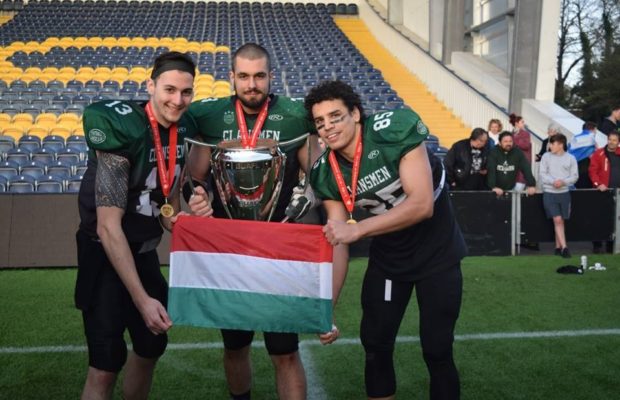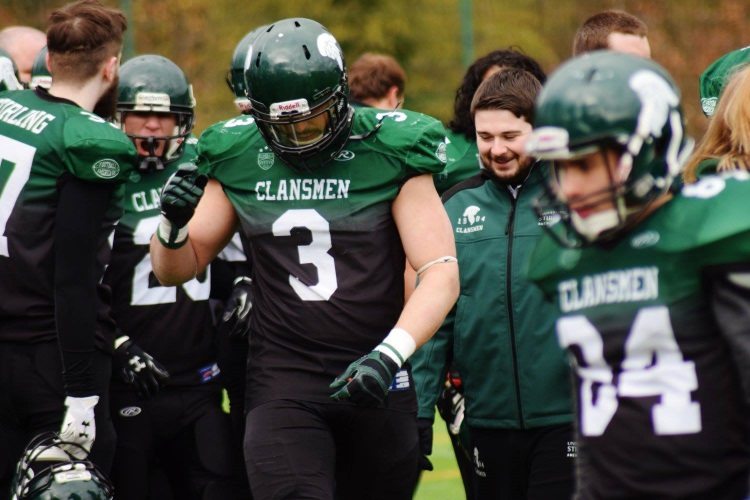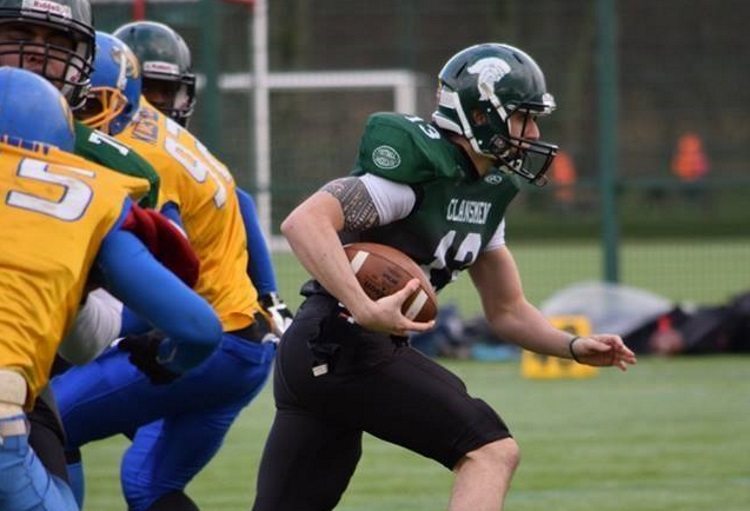Hungarian brothers-in-arms battling for Scotland’s Stirling Clansmen

Scotland’s Stirling Clansmen relied on a Hungarian connection to capture their third British University American Football title in the past five years this past March.
The Clansmen are one of the most successful teams in the 83 team British University and College Sports (BUCS) league and in March with a lineup including three Hungarian players. Márk Poprádi and brothers Bence Kovács and Dániel Kovács helped beat the Durham Saints 10-7 to capture their third title.
The University of Stirling offers foreign students the opportunity not just to study there but to compete in sports. The Hungarians, took full advantage of this.
Bence Kovács (DL, LB) is preparing for his fourth year in Marketing and has already played three seasons for the Clansmen. He has been the best defensive player on the team for the last two years and currently he is the captain of the defense. Brother Dániel Kovács (QB) is a student of Sports Studies and he has played one season with the Clansmen. He is highly experienced having played for several Hungarian teams. He followed his brother to Stirling University.

Bence Kovács
I had a chance to sit down with the brothers to ask them about their experience playing with the Clansmen.
László Makranczi: First of all, how did this opportunity come for you?
Bence Kovács: I wanted to go to the US, where I had some contacts to junior college and second division college teams. I did my exams but I did not go to the States. Then I made a Europlayers profile and the head coach of Stirling contacted me. He wanted me to play for the Clansmen. I had other opportunities to play for money elsewhere; nevertheless I chose to have a degree and to play for Great Britain’s best college team. This made my decision easier.
Dániel Kovács: I also wanted to play abroad. In addition, my brother told me about the Clansmen detailing the good conditions and the education. I decided to send my videos to the coach and he invited me as well. After high school and 2 years of work I did all my exams. I also kept in touch with the Stirling’s coach and did the entire workout he recommended.
L.M.: Was it difficult to get used to the atmosphere there?
D.K.: For me: yes! Learning English was the hardest. However, as time went by my English got better and now I can communicate with everyone. I must add that my teammates and a lot of people at the University helped me. There is a well-developed system for foreign students here. I think it was easier to fit into the team. The more experienced players knew how to handle newcomers, so they could help me too. Moreover, in the team there was always a common topic to speak about.
B.K.: I also had the same experience. However, in my second year everything became better and easier. I am sure I have made lifelong friendships here.
L.M.: What is football like in Scotland compared to Hungary?
D.K.: I think speed, physicality and game intelligence is better in Scotland. There are a lot of American coaches here, even from the first and second division of NCAA. We can learn from them as well, even if they are coaching the opponent. One can improve even by learning from the opponent. To sum up, I was surprised by the level of the game here. It is very entertaining.
B.K.: Since we are playing in the first league, there are a lot of English teams as well. In addition, we are the only Scottish team in the first division. I would also highlight the speed of the players. Although they are rather small, but their technique is better. This means a greater challenge for me. In the offensive line there are several left tackles with good qualities, who played NCAA football. The final was also well-organized in a huge stadium. It was fantastic.

Dániel Kovács
L.M.: You have different game experience since Dániel plays in the offense and Bence on defense. Can you expand on that?
B.K.: I came here as an experienced player, thus I had the technique and all the basics I needed. Still, I had difficulties to adapt to a new system but I am a fast learner. In addition, I have very good D line coaches who could always show me new things.
D.K.: In the beginning, it was hard to get used to the new system. As a quarterback it is always harder. I learned a lot in Hungary under a few seasons. For example, how to be calm and how to stay focused. Nevertheless, I learned the complexity of this position in Scotland. In time, I started to see how things are going during the plays. As if I was playing a whole new sport. I got used to the playbook and to the no-huddle offense. I had the biggest opportunity in the semi-finals. I could put everything I learned into practice and we even won the game.
L.M.: You also participated in the Hungarian national teams’ open try-out.
D.K.: It was fun! The coaches seemed well-prepared. In addition, I met a lot of players who I used to play with. It was strange but at the same time good playing alongside them again. I think football in Hungary has improved in the last few years. The players who I used to play with got better. It is good to see this. However, I also have to improve. I developed in reading the defense. The coaches highlighted this capability from me.
B.K.: I also had a good time. I met a lot of my former coaches and teammates. However, I was not satisfied with my own performance. I did not have my shoulder pads and helmet on since March. I think the D-Line became better.
L.M.: Do you think you will ever play for a Hungarian club?
D.K.: I think it is possible for me when we have 5-6 months to play elsewhere in the off-season. The other option would be the National Team, if not in a Hungarian club.
B.K.: I would not exclude the fact, but now I do not really see the possibility of this right now.